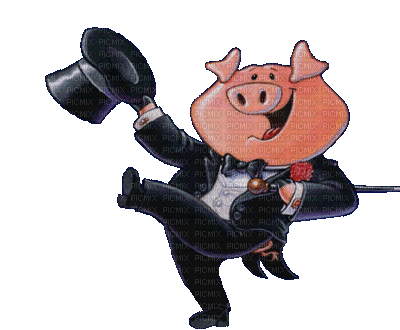Various Legends around Béziers
Saint Nazaire and Saint Celse
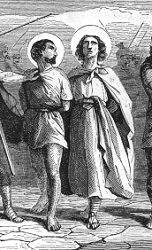
As our cathedral has St Nazaire's name, it seemed judicious to me to tell his legend : Nazaire was born in Rome during the 1-st century, from a heathen father, named Africanus, and a pious mother named Perpétue, who had been baptized by Saint Peter.
The child learnt admirably maternal lessons and shone with its precocious virtues and his innocence. When he was nine years old, Nazaire was sought by his father to abandon Christianity; but he preferred the truth to the lie, was baptized by Saint Lin and became one of most fervent Christians of Rome.
His father, irritated, used violence to overcome his firmness; but, finally, full of admiration for his son, he supplied him the means to carry out his fearless project to go to preach faith. Nazaire went through Italy, sowing the Gospel among the heathen populations and edifying them by his virtues.
In Milan, the first care was to go to visit the martyrs Gervais and Protais in their prison and to strengthen them in the fight by the use of his wise words.
Captured himself as Christian, he was cruelly flogged and expelled from the city. Near the French town of Nice, he found a child named Celse who becomes his disciple. He educated him, baptized him and, from this moment, Nazaire and Celse became inseparables. Conversions multiplied in a surprising way; Nazaire was again subjected to cruel tortures, then got again freedom with obligation not to reappear any more in this country.
So the two holy young men went through the Alps, crossing with courage immense and solitary forests, inaccessible cliffs, rare villages where lived poor idolatrous men, and arrived to Embrun, where their zeal operated miracles of conversion. Vienna, Geneva, Treves heard their voice, made eloquent by the love of Jesus Christ. Contradictions and persecution gave to their preaching a new fertility.
Condemned to drowning, they walked on water as on the ground. After this brilliant miracle, Nazaire and Celse went through the Milan road, where they were soon arrested as Christians and zealots of the faith. In the reading of the judgment of death, they joyfully hugged each other : "What an happiness for us to receive today the martyr's crown", exclaimed Nazaire !
- "I send you my gratitude, ô my God, to receive me, so young still, in Your glory.", said Celse. They were then led to a public square of Rome, where they had the head cut, at about the year 56 of the Christian era.
Their tombs were recovered by Saint Ambroise, who described the Nazaire's body as not corrupted, "emanating a marvelous odor, without corruption and with his barb and all his hair".
Abbé L. Jaud, Vie des Saints pour tous les jours de l'année, Tours, Mame, 1950.
The Caritats' Galley
From many years, the holidays of Caritats offered to the spectators, besides the parade of the Camel, the spectacle of the Galley. The boat, on wheels, allowed to store the blessed breads or other foodstuffs intended to be sent to the crowd during the parade. It would seem that there were even two galleys : on December 29, 1564 (others assert it was on the next January 4), Charles IX (14 years old) with his mother, were invited to watch - in front of the door of the Carmelites - a two galleys' fight.
The boats were equiped with an ingenious system animated with a reeling and rolls' movement.
The crew was dressed as Turks. Indeed, fashion was, during this icy winter, to wear clothes from Turkish inspiration and all the whole court was dressed in this style (baggy trousers, turbans, glimmering dresses, etc.).
Forbidden in 1661 by the clergy and in spite of a lawsuit lost by the city, this tradition came back again in 1662. The galley was burned on May, 2-3, 1663 and was never reconstructed.
The resurrection arrived in 2000 due to the Mermoz High School students' work :
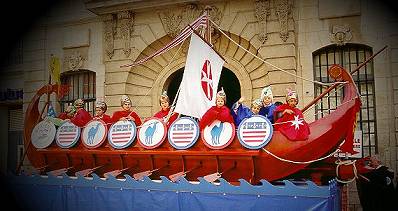
The Malpas' Legend

We all know this famous tunnel drilled in the mountain, between Colombiers and Nissan. This passage, dug at first by Romans to drain Montady's pond, was enlarged under Riquet's orders to have the Canal du Midi pass through.
The name "Malpas" (bad passage) lets suppose the difficulty of the work.
A legend is attached to this place : An hermit named Arthus had settled under the vault. This former employee of the Canal's building would have returned there after his wife, tired to wait for him, left him.
When he saw a barge to approach, he sent a rope with a basket at its end so that bargees offered to him something to eat.
However, this story would be in fact only a bargees' joke : in every passage, they asked the youngest deck-handfroth to prepare a basket for the hermit and to shout high and strong his name so that he gets back the provisions. As the hermit didn't answer, the crew was cheerfulness divided finally the basket's content.
The Animals "Totem"
Our region possesses several animals "Totem". The "Totem" is the emblem which protects the clan. I have already evoked the Béziers' one, Lou Camel, but there are many others I am going to tell you :
- The donkey of Bessan

We can find two stories for this legend :
The first comes from a donkey's fair which took place on the Donkey's road. During this fair, the most beautiful donkey : "l'ane désignat", was elected and then paraded through the village with oboes's sound.
The second version would result from the village of Gignac : In the VIII-th century, during the Saracens' invasions, the Gignac's inhabitants were warned of an imminent assault by an donkey's brays, allowing them to organize resistance and to save their village.
However, the aggressors took the animal and threw it in the Hérault river. Our poor animal drifted to Bessan where it was took in, cured and became since the animal fetish of the village.
The origin of this last legend seems however to come only from the beginning of XX-th century.
- The Foal of Pézenas
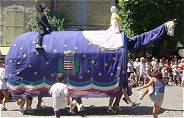
In 1226, the king Louis VIII made stage in Pézenas. Besides the troop, he had taken with him a magnificent mare he particularly liked. Regrettably, the animal fell ill during the stay and the King resigned to leave it to the Piscinois' care when he had to leave again. When he came back, the mare appeared healthy. During the stay, it had gave birth to a magnificent foal. This one was presented to the King, head decorated with foliages and ribbons.
The monarch, very pleased, decided then to immortalize event by proposing the construction of a wooden foal which would be a part of all local holidays. Tradition continues still and the foal parades in the Pézénas' streets with two personages on its back : a woman and a man named : Estiennet and Estiennetto, because of a 1622's anecdote : this year, a galland field marshal took on his horse a young peasant girl to make her cross the Peyne, a Pézénas river.
- The Goat of Montagnac
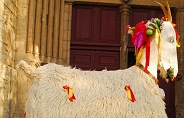
Around 1200, the consul of Montagnac's wife, Anne, suffers from a strange disease. No doctor is able to cure his sickness nor to find its roots.
A rag dressed man accompanied with a beautiful white goat arrives then, in the village. The man amazes with his joy of living and his elation.
The villagers, intrigued, ask him where his cheerfulness comes from. "I possess a secret giving enjoyment and health", he claims. This story is immediately reported to Jacou the Consul. This one promises to the man a big reward in exchange for his secret. "My goat gives a magic milk" the "paillous" says; "I agree to give you my "cabreta" (little goat), but you will have to feed it with grapevine's bines and grapes to keep the virtues of its milk". The deal was concluded and, after belle Anne had consumed the miraculous milk, she recovered quickly, returning enjoyment to her husband and all the villagers.
- The Hedgehog of Roujan : "Lou Roumégaïre"
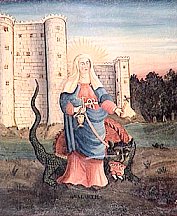
Legend tells that Sainte Marthe, chasing the Tarasque (a legendary animal from Tarascon) which terrified the Low Valley of the Rhone, raised an army of hedgehogs to fight the monster and to protect the village. But the Tarasque didn't come and the hedgehogs were authorized to go back to their districts. Only one decided to stay in the village where it was fed and was cherished by the inhabitants who made their animal an fetish.
If the epic of Holy Marthe against Tarasque is situated in the years 48 to 68, it seems the origin of Roujan's legend took place later : it seems to arise from a Middle Age event. This is the story:
Around the first millennium, the consul of Roujan had offered meals and lodging to a foreigner he met along the Oum river's shore. But, it appears that this foreigner was a spy working for bandits who terrified the region.
All day long, the man asked numerous questions about the village defences, about the soldiers patrols, about the villagers armament, and so on. At night, in secret, the foreigner got up with the aim of leaving the village and warning his accomplices who were waiting for the attack.
Unfortunately our man puts the foot on a hedgehog which had escaped from his cage : in these ancient times, it was usual to capture hedgehogs whose flesh was appreciated as a meal of choice. So, the spy begins to shout and growl ("rouméguer" in Occitan : "lou roumégaïre" means "the grouch").
These shouts alert the consul who gets up and realizes that the man ran away. Foreseeing events to come, he alerts the soldiers and puts the village under alert. So, at dawn, when bandits' band appears in front of fortifications, all Roujanais are presents, weapons in the hand. The effect of surprise falling so, the bandits abandon their disastrous projects and run away in the campaign, in the big enjoyment of villagers.
So, later, when the consul told this story, he said: " O roumégat et mé sio i lébat! ". Some saw there an allusion on the foreigner, others on the hedgehog and it is this last one who continued in the course of centuries !
- The Frog of Lieuran-lès-Béziers
(Text of the legend got on lieuran-les-beziers.blogspot.fr website)
In 1694 under Louis XIV time and according to the legend , a terrible famine reigns, the harvests are disastrous, the roads invaded by beggars and Protestants on the run, the epidemics spread.
The village of Lieuran does not escape these calamities. The only recourse is prayer and pilgrimages. One day, a storm of rare violence breaks out. The villagers, in front of the frightful noises, still believe in a divine punishment and leave the church.
The legends had said it, but there they saw it with their eyes: mixed with the drops of rains, millions of small frogs fall from the sky everywhere on the roofs, the streets, the gardens and the vines. Bringing food, comfort to the hungry Lieurannais, but also covetousness and jealousy of neighboring villages that nicknamed the inhabitants of Lieuran-les-Béziers, "Los Beca-ranetas" or "Los beco ranas" (the frog-eaters).
The Narbonne Witch
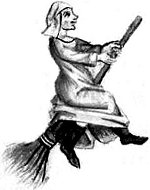
Once upon a time, in the city of Narbonne, was a very beautiful girl who lived in the neighborhood "Les Tuileries", not far from the door of Perpignan. She was so beautiful that many suitors had tried, in vain, to ask her for marriage. However, she always refused, pleading that as she was only 20 years old, she was too young to be married.
But one day, she met a beautiful wealthy young man who had just settled down, with the family, in Narbonne.
The two juveniles fell in love at once, loved each other and got married. In the beginning, their happiness seemed perfect and our two young turtledoves were bathed by love.
One night, later, the bridegroom woke up and wondered himself not to see his wife in the conjugal bed. When she reappeared, he asked her :
- Where did you go ?
- I sleepwalk : I often get up unconsciously and I wake up sometimes in the countryside, the wife said.
The next night, the bridegroom woke up again and noticed that his wife had still disappeared. He became then suspicious and, as in the following days he suffered from a strong migraine, he suspected his wife to make him drink some potions, with the aim to let him be profoundly asleep.
He noticed that his wife, although she was plump, contented himself with a simple glass of water during meals. Each time he attempted to get her to eat, she answered :
- I am not hungry.
- But how do you do not to lose weight while you eat nothing ?
- It is my corpulence, she said, each little food I swallow is enough to me !
Becoming more and more suspicious, the husband decided, the next evening, not to swallow or drink anything. During dinner, as soon as his wife looked away, he emptied his glass of wine on the ground and threw away the meal in the fireplace.
Then, giving as pretext he was extremely tired, he told his wife to go to bed. He began to snore so loud that his wife thought he had plunged into a profound sleep. So she thought she could finally leave. She rode the kitchen's broom and pronounced these strange words :
"Foot on leaf, leave through chimney !".
Through his half-closed eyes the husband - dismayed - saw the broom begining to rise in airs. As soon as his wife left the place, he dressed quickly his trousers and began to follow her. The direction ske took led our man towards the quite close cemetery.

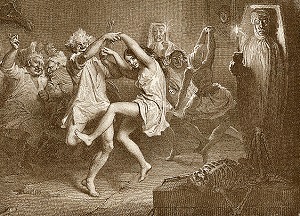
Arrived on the place, he lurked behind bushes to observe the horrifying scene tooking place in front of him : about twenty witches danced around a grave recently dug. Others quarrelled to get organs of deceased they had just boiled in their cauldron.
Terrorized but also heart broken, our man decided to go back and wait for the return of his wife. He went to bed and, three hours later, his wife returned, sliding discreetly into the bed. The husband tried to contain his fury all next day long but, at evening, he was not able to retain his anger as she refused again to eat :
- Oh naughty girl ! Yesterday evening I followed you to the cemetery and I know now who you really are !
The witch, imperturbable, fixed him with a black glance and answered :
- So you saw me; you saw what no mortal has the right to see but right now, you will never see me anymore with an human sight !
Then she pronounced some magic words and immediately our poor man was metamorphosed into dog ! Then she took the broom and chased away our wretch.
"What a misfortune to have married a witch; I'm in such a trouble now !", he thought. He ran towards the neighbours' house, towards people he knew, but each time, he was repulsed.
- Get out of here, mutt ! put your fleas somewhere else, we don't need you ! they said.
During several days he roamed here and there, trying to find something to eat. But each time he found a bone to gnaw, the other dogs, more hardened, beat him unmercifully and stole him the precious meal. Starved, exhausted and depressed he roamed in the streets of the city when a baker noticed him :
- What a beautiful nice dog ! You would be very useful for me to keep guard my bakery ! Do you want to come with me ? I am gonna give you something to nibble.
Our dog hadn't to be prayed more for that and, wriggling the tail, he followed this so kind woman. She gave him food, washed him and settled him in front of the fireplace where he was able finally to sleep quietly.
The next day, thankful, he did everything he could to help the kind baker : he opened and closed the door to the customers,
watched the possible swindlers and grumbled them when it turned out necessary.
Due to his very fine hearing, he was able to recognize
the false coins only by hearing them ringing. Numerous times, he had thwarted the plans of rascals who tried to cheat with his mistress.
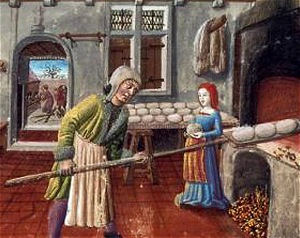
This peculiarity came one day to an old woman's ears who had reputation to be healer. She come to the bakery and, as soon as she saw the skill of the dog, she exclaimed :
"But this dog is human ! There isn't any other possibility : someone have send a spell on it !".
After claiming so, she took out, from her underskirts, a phial containing a strange liquid and splashed our canine from the head to the tail. Immediately the dog became again a man and covered the old woman and the baker with kisses. Then he told in detail his story and how he had been transformed.
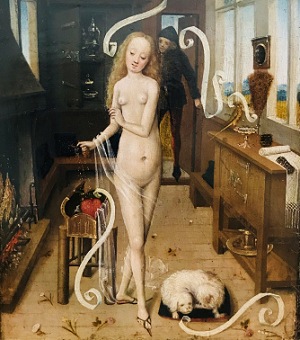
- Now, you must be careful, the old woman said, if your wife realizes you became again human, she is able to transform you once again. Imagine she changes you in toad or in glow worm ! Take this phial and keep it with you. As soon as you will see your wife, throw its contents on her and so you will be able to metamorphose her in animal. You will have only to pronounce the name of the animal you wish.
Our man thanked again his two friends and, just before midnight, returned at home. Hid behind of the entrance door he waited for his wife. Returning from the Sabbath, this one arrived. As soon as she was on the threshold, her husband splashed her with the magic liquid.
- Be a mare ! he said.
No sooner said than done : the wife was transformed into mare. The man took a whip and gave her a beating knocks so strong as the mare had no more force to leave. The next day, he sold the animal to the "poubellaïre" (the dustman) of the city and, since, the naughty wife collects the garbage of the whole village !
The Moujan Fairy
Around 1200's, in Moujan's hamlet, near Narbonne, was a man named Jean Bistan. Our man used - on the road of the vineyard - to pause for drinking to a fountain, still visible nowadays, a fresh and clear water he delighted in it with pleasure.
During the warmest summers, the shadow of the big plane trees, which lined the fountain, brought him freshness and gave him force to go back to work. In the evening, by returning, Jean never missed to pause there to wash up and to remove the dust accumulated during his long hours of labour.
An evening when he returned, exhausted by tiredness, he approached the familiar gurgling and sat down in the soft herb to take advantage of this daily rest's moment.
Nevertheless, this day had something different : only the noise of the water was audible, but no cricket, no cicada, no bird song. Even the sheets of plane trees, caressed by the evening breeze, did not produce any sound.
Surprised our friend Jean raised the head and noticed a shape laying near the fontaîne. He got up, and saw a very beautiful sleepy girl, quite dressed in white lace, as beautiful as a princess! Her hand brushed water in a so delicate manner that he was moved.
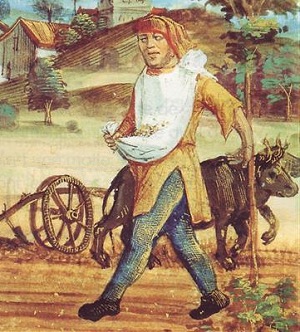
He got back his mind and remembered magnificent stories his parents told him when he was a child during the long winter's evenings. There was no more any doubt: this could be only a fairy, a Mitoune as it was named in the country! Despite of fatigue, he approached her noiselessly and, supple as a cat, jumped on the girl to retain her captive.

She woke abruptly, pushing a shout of distress and trying to release herself by struggling. Jean squeezed her even more hardly, preventing her from making any movement.
- Beautiful fairy, he says, don't be afraid, I don't want to hurt you but you are my prisoner. I'll free only if you promise to make me the richest man of the country. I want the most beautiful vineyards giving the best wines. I want also a big house with sixteen windows in facade then a half-dozen of horses and their carts.
- Please free me, complained the fairy, you suffocate me, if you continue, I shall not be able to do anything at all. Is it really what you want?
Our man understood he had been a little bit too strong and loosened his grip by maintaining nevertheless the arms of the beautiful: he did not want to let passing this unhoped chance as long as the fairy had not promised : he was well determined not to let her go.
- I promises you, one more time , not to hurt you; swear me that you will fulfill my wishes and I'll free you straightaway ! The Mitone understanding it was the only way to get her freedom accepted :
- Let me go and as soon as I shall be in my palace I shall take charge of you. Do not expect to become rich from day to day, but I shall keep my words: you will get what you asked for : I promise you.
- OK, Jean says, I rely on you. And he released her immediately.
The fairy, relieved, rubbed his arms bruised by the embrace, arranged gracefully her lace dress, her long golden hair, drank a mouthful of fresh water and disappeared noiselessly in the twilight. Immediately cicadas and birds recovered to sing, the breath of the wind, through the foliages, became again audible and some crickets began their night-concert.
Then Jean, still under the emotion, drank fresh water asking himself if the event was a dream or not and then went back towards his poor hut the heart filled with enjoyment and hopes. The next morning, he came back, as usual, to the vineyard. He noticed that the ground was supple, that there were less stones and the grapes seemed filled with nectar. The harvest was premature and extremely fruitful: never the vineyards had so much produced. The wine he got had an exceptional quality, so good that people came from everywhere to buy it and was ready to pay a very good price.
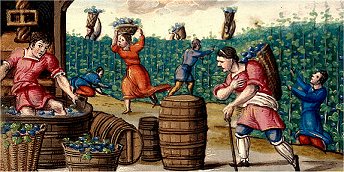
Phenomenon happened again next year, then the year after, then every other years. Jean was able to buy new vineyards which also produced in profusion a beverage deserving of gods. His fortune growing, he bought the house of his dreams, numerous horses and numerous carts.
Every day he paused at the fountain place, blessing the day he met the magnificent creature. He told one day the story to the country's bishop, but this one had trouble to believe him. Later, our man invests in the maritime business where, once again, his success was fabulous.
In 1204, doubtless because of the chance he got, he donated one of his properties, the " domain of Olieux ", to the Fontfroide's monks. The only condition was that these monks had to establish there a women's Cistercian convent, certainly in homage to the beautiful Mitoune who had brought him happiness and prosperity.
The Faugères Mayor
In bygone days, in the village of Faugères, there were two religious communities : Catholics and Protestants. That did not cause any problem in the everyday life but, at the municipal elections' time, everything was different : Indeed, there was no monarchic, right, left list, radical or reactionnary, but only Papistes (Catholics) and Parpaillots (Protestants).
At the elections' time every group managed to have the same number of vote as the political opposite side and that gave many problems to determine the choice of a mayor. No solution had been found and the attempts to alternate a mayor Catholic with a mayor Protestant, every week, had been refused by the sub-prefect of Béziers: a mayor for six years was needed and the Republic's laws had to be apply to all, even to Faugères.
Debates becoming more and more fired, it was necessary to find a solution and it was the stationmaster who proposed one:
- The train express of Montpellier stops here every day to take water. We just have to ask to the first passenger we see inside the first class of the train and swear to obey to what he'll say..
Everybody swore and, the next day, the entire village waited for the arrival of the train. A single passenger occupied the first classes. It was a small cheerful person, with a Parisian accent, who accepted to answer the question:
- Messieurs, he said amused by the demand, there is only one way to solve the problem : ask to your strongest young man to throw an apple on the road and the first of you who catches up it will be appointed as mayor.
The train left the village and the villagers agreed that this idea was not so stupid. So, they decided to organize the trial run on the road of Béziers, the next Sunday. The day coming, candidates of the two lists were aligned on the starting line, ready to jump up, and a young man threw the apple with all his forces on the road. Papistes and Parpaillots ran in the pursuit but a pig, coming from nowhere, caught the fruit and swallowed it straightaway. It was consternation among the crowd. However, a voice spurted out the silence :

- Viva mister pig! Viva the mayor !
At first, the villagers were surprised and stunned. But then - idea travelling in the minds - everybody applauded. Only the old man "Sampastous", the owner of the pig, protested :
- That is my pig and I intend to transform it in sausages and hams for Christmas, whatever it is mayor or not!
- You will be paid for your pig, the others answered, don't be worry for that..
So, money was taken from the city hall's cash desk to pay the pig and provide its maintenance. The city hall's secretary, Frayssinous, drafted the report and sent it by mail to the sub-prefect. This one didn't be too surprised that a mister " The Pig " was appointed as mayor, too satisfied the conflict was finally solved.
So everything took place normally : Cardinous the Parpaillot and Lesparrous the Papiste were appointed as assistants of the pig, sharing fairly the work. The mayor, too well fed, became enormous.
The Christmas holidays approaching, the municipal councillors began to watch it with greed:
- It is so big that it is going to explode and die soon, they exclaimed. It would indeed be pity... Let make some sausages and hams with it and let replace it with another pig !
Vote was subjected to the City Council the next evening and decision was taken to replace the pig. The former mayor was carved up in equal parts and each one got his piece.
So, along the next years, it is mister " The Pig " who obtained all the votes in every municipal election, but none of the council's members had the courage to tell to the sub-prefect that the mayor was eaten every Christmas !
